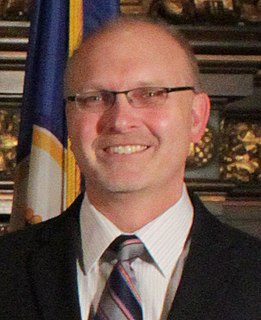A Quote by Samuel Johnson
The hostility perpetually exercised between one man and another, is caused by the desire of many for that which only few can possess. Every man would be rich, powerful, and famous; yet fame, power, and riches, are only the names of relative conditions, which imply the obscurity, dependence, and poverty of greater numbers.
Related Quotes
The contempt of riches in philosophers was only a hidden desire to avenge their merit upon the injustice of fortune, by despising the very goods of which fortune had deprived them; it was a secret to guard themselves against the degradation of poverty, it was a back way by which to arrive at that distinction which they could not gain by riches.
The absence of effective State, and, especially, national, restraint upon unfair money-getting has tended to create a small class of enormously wealthy and economically powerful men, whose chief object is to hold and increase their power. The prime need is to change the conditions which enable these men to accumulate power which is not for the general welfare that they should hold or exercise. We grudge no man a fortune which represents his own power and sagacity, when exercised with entire regard to the welfare of his fellows.
Every man has some reminiscences which he would not tell to everyone, but only to his friends. He has others which he would not reveal even to his friends, but only to himself, and that in secret. But finally there are still others which a man is even afraid to tell himself, and every decent man has a considerable number of such things stored away. That is, one can even say that the more decent he is, the greater the number of such things in his mind.
Confusion conditions activity, which conditions consciousness, which conditions embodied personality, which conditions sensory experiences, which conditions impact, which conditions mood, which conditions craving, which conditions clinging, which conditions becoming, which conditions birth, which conditions aging and death.
To crave wealth and honor, to demand power, to pile up riches, to gather all those vanities which seem to make for pomp and empty display, that is our furious passion and our unbounded desire.On the other hand, we fear and abhor poverty, obscurity, and humility, and we seek to avoid them by all possible means.
Nature attains perfection, but man never does. There is a perfect ant, a perfect bee, but man is perpetually unfinished. He is both an unfinished animal and an unfinished man. It is this incurable unfinishedness which sets man apart from other living things. For, in the attempt to finish himself, man becomes a creator. Moreover, the incurable unfinishedness keeps man perpetually immature, perpetually capable of learning and growing.





































